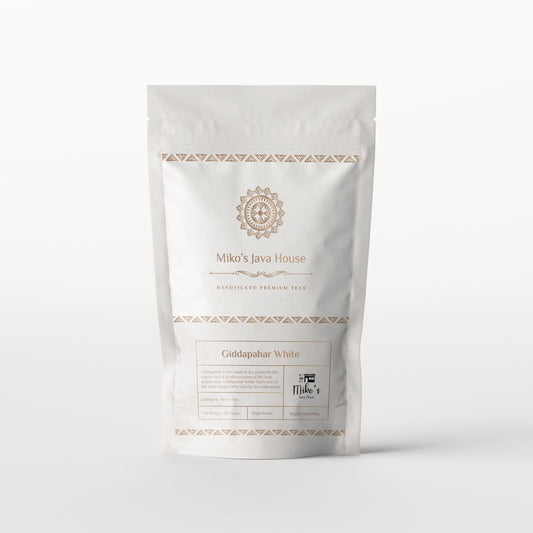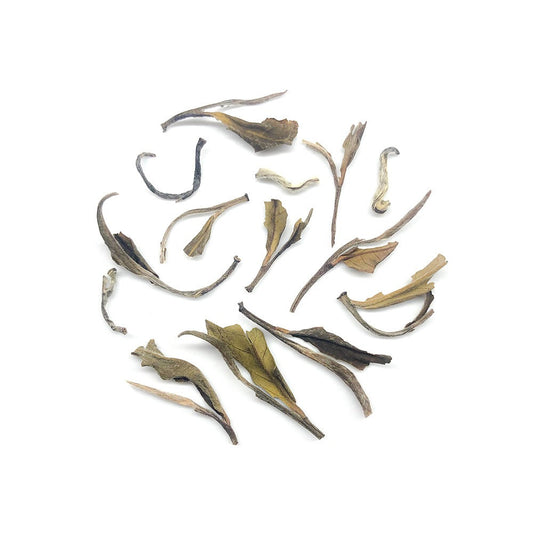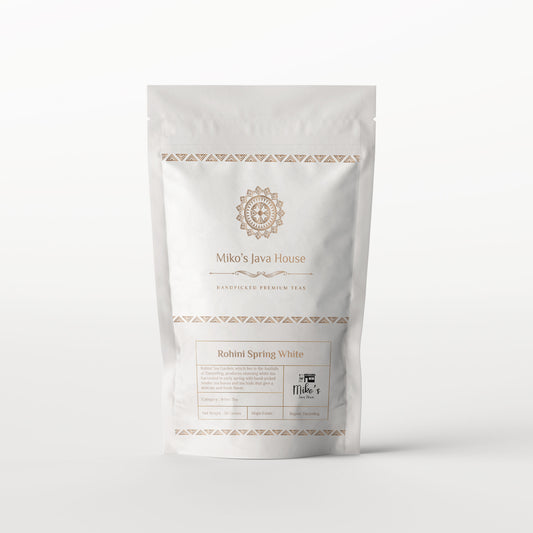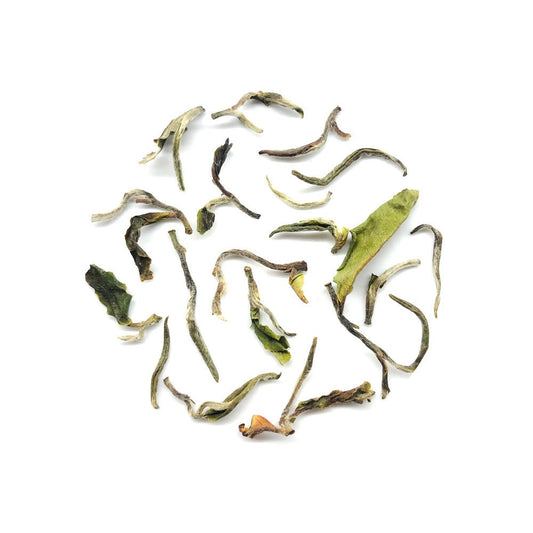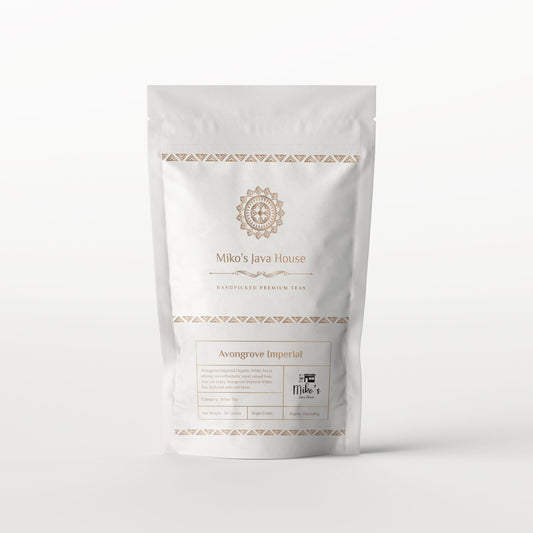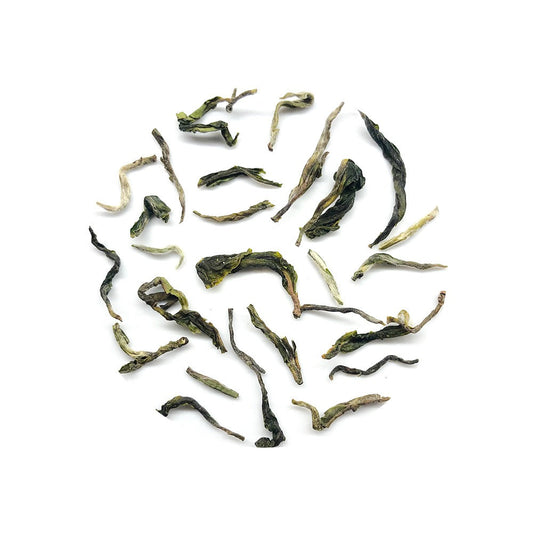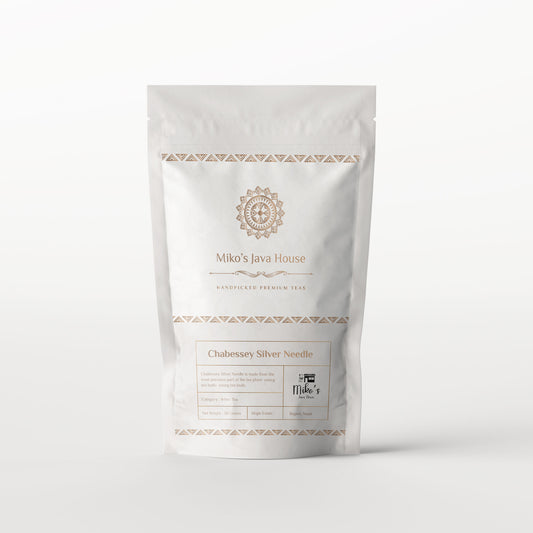White Teas
Introducing our exquisite White Tea Collection – that transcends ordinary tea experiences. Shop our White Tea Collection now and embark on a journey of sensory delight and well-being.
-
Giddapahar White Tea
Regular price $22.75USDRegular priceUnit price / per -
Rohini Spring White
Regular price $28.60USDRegular priceUnit price / per -
Avangrove Imperial White Tea
Regular price $29.31USDRegular priceUnit price / per -
Chabessey Silver Needle
Regular price $17.41USDRegular priceUnit price / per
Collapsible content
About White Teas
Unveiling the Delicacy: White Tea Explored
Have you ever craved a cup of tea that's both light and refreshing, yet surprisingly complex in flavor? Then look no further than white tea, a unique and treasured variety in the tea world.
White Tea: A Masterpiece of Minimal Processing
Unlike its black and green tea counterparts, white tea undergoes minimal processing, allowing its delicate nature to shine through. Imagine this: young tea buds and unfurled leaves, plucked at the peak of freshness, are simply dried and minimally handled. This process preserves the tea's natural antioxidants and creates a visual feast – the silvery-white down that often covers the buds gives white tea its name and adds to its allure.
A Symphony of Flavor and Potential Health Benefits
White tea is renowned for its subtle sweetness and delicate floral notes. Each sip offers a refreshing escape, perfect for a warm afternoon or a calming evening ritual. Beyond its delightful flavor, white tea is also believed to offer a range of potential health benefits. Studies suggest it may be high in antioxidants, which can help combat cell damage in the body. Additionally, some research points towards white tea's potential to improve oral health and aid digestion, although further studies are needed.
Who Should Sip on White Tea?
White tea truly caters to a diverse audience. Are you a tea connoisseur seeking a unique and nuanced flavor experience? White tea is an exquisite addition to your tea journey. Perhaps you're health-conscious and looking for a beverage rich in antioxidants? White tea might be the perfect fit. And for anyone who enjoys a light and refreshing drink, white tea offers a delightful escape from the ordinary.
Ready to embark on your white tea adventure? Join us as we delve deeper into the world of white tea varieties, brewing techniques, and explore the potential health benefits this delicate beverage may offer.
The Allure of White Tea: A Delicacy Untouched
In the world of tea, white tea stands out as a true rarity. Unlike its more robust black and green cousins, white tea boasts a delicate nature and a whisper-soft flavor profile. This unique character is a direct result of its minimal processing, making it one of the least processed teas in existence.
Imagine this: young tea buds, still veiled in a silvery down, are plucked at the peak of freshness. Minimal handling and a swift drying process are all it takes to transform these delicate buds into white tea. This lack of processing allows the tea to retain its natural antioxidants and subtle flavors, creating a truly special beverage.
Here's what makes white tea so alluring:
- Untouched Elegance: The minimal processing preserves the natural white fuzz on the buds, giving white tea its name and a visually stunning appearance.
- Subtle Nuances: Unlike black tea's boldness or green tea's grassy notes, white tea offers a delicate and nuanced flavor profile. Expect hints of honey, melon, or even floral notes, depending on the specific variety.
- A Touch of Sweetness: White tea is naturally slightly sweet, making it a delightful option for those who prefer their tea unadulterated with sugar or honey.
By embracing minimal processing, white tea allows the natural essence of the tea plant to shine through. It's a testament to the beauty of simplicity, offering a cup that is both elegant and refreshingly pure.
Unveiling the Delights of White Tea Varieties: A Journey Beyond the Basics
White tea, treasured for its delicate flavor and minimal processing, offers a unique experience within the tea world. But did you know there's more than one kind of white tea? Let's delve into the fascinating varieties of white tea, each with its own subtle charm:
1. Silver Needles (Yin Zhen): The undisputed crown jewel of white teas, Silver Needles are made from young, unopened buds covered in silvery white hairs. These delicate buds produce a light, ethereal brew with hints of honey and melon. Imagine a sip pure elegance!
2. White Peony (Bai Hao Yin Zhen): This white tea combines young unopened buds with a few slightly open leaves. The result? A slightly fuller-bodied brew compared to Silver Needles, offering a touch more complexity. Expect floral notes alongside the signature white tea sweetness.
3. White Peony Shou Mei: This white tea, often referred to as "Brow of Longevity," takes a slightly different approach. Shou Mei uses older tea buds and leaves, resulting in a more robust cup with earthy and sometimes honeyed characteristics. While not as delicate as Silver Needles or White Peony, Shou Mei offers a satisfying richness for those who enjoy a more pronounced flavor.
Beyond the Names: A World of Flavor Nuances
While these are the most common varieties, the world of white tea extends further. Region and processing methods can also influence the final taste profile. For example, white teas from Fujian province in China are known for their floral notes, while those from other regions might offer hints of honey or even stone fruits.
A Sip of Discovery:
The beauty of white tea lies in its exploration. Each variety offers a unique taste experience, from the ethereal sweetness of Silver Needles to the satisfying earthiness of Shou Mei. So, grab your cup and embark on a delicious journey through the world of white tea!
Unveiling the Delicacy: Brewing the Perfect Cup of White Tea
White tea, with its silvery-white buds and delicate flavor, is a treasure trove of taste and potential health benefits. But unlike its black and green tea counterparts, brewing white tea requires a gentle touch to unlock its full potential. Let's delve into the secrets of brewing the perfect cup of white tea!
Temperature Matters:
Unlike black tea, which thrives in boiling water, white tea prefers a slightly cooler temperature – ideally around 175°F (79°C). This prevents the delicate leaves from burning and ensures a smooth, nuanced flavor. Imagine simmering water rather than a rolling boil.
Filtered Water for Pure Flavor:
Just like any tea, using filtered or spring water makes a world of difference. Unfiltered tap water can introduce unwanted minerals or chlorine that can mute the subtle notes of white tea. Think of filtered water as a blank canvas, allowing the true essence of the tea to shine through.
Time is of the Essence:
Unlike black tea that can withstand longer steeping times, white tea steeps quickly. Typically, 1-3 minutes is the sweet spot for a delicious cup. Over-steeping can lead to bitterness, so set a timer or keep a watchful eye. Remember, patience is key, but not too much!
Loose Leaf vs. Tea Bags:
Both loose leaf and tea bag options exist for white tea. Loose leaf tea offers more control over the brewing process and allows the leaves to unfurl fully, potentially resulting in a richer flavor. However, tea bags provide convenience, especially for beginners.
Here's a quick tip: If using loose leaf tea, a general rule of thumb is to use 1-2 teaspoons per cup of water. Adjust the amount based on your desired strength.
Brewing Bliss:
- Heat filtered water to around 175°F (79°C).
- While the water heats, preheat your teapot or mug with hot water (optional but helps maintain temperature).
- Add your desired amount of loose leaf white tea or place the tea bag in your teapot or mug.
- Pour the hot water over the tea leaves and let it steep for 1-3 minutes.
- Gently remove the tea leaves or tea bag.
- Sit back, relax, and savor the delicate flavor of your perfectly brewed white tea!
Bonus Tip: White tea leaves can often be infused multiple times. Simply add hot water to the same leaves for a second or even third cup, adjusting the steeping time slightly for subsequent infusions.
With these simple steps, you'll be well on your way to brewing a cup of white tea that is both delicious and invigorating. So, experiment, find your perfect steeping time, and enjoy the unique experience that white tea has to offer!
White Tea: A Delicate Brew with Potential Health Perks
White tea, with its silvery-white buds and young leaves, offers a captivatingly light and refreshing taste experience. But beyond its delicate flavor, white tea boasts potential health benefits that have piqued the interest of many. Let's delve into the world of white tea and explore its wellness potential, keeping in mind that consulting a doctor is always recommended for personalized health advice.
Antioxidant Powerhouse:
White tea is minimally processed, which helps it retain high levels of naturally occurring antioxidants. These antioxidants are like tiny warriors in your body, helping to combat free radicals – unstable molecules that can damage cells and contribute to various health concerns. By neutralizing these free radicals, white tea may offer some protection against certain chronic diseases.
Oral Health Hero (Maybe):
Preliminary studies suggest that white tea extracts might help reduce the growth of bad bacteria in the mouth, potentially contributing to better oral health. However, more research is needed to confirm these findings. Remember, maintaining good oral hygiene habits like brushing and flossing is still your best defense against oral health issues.
Digestive Dance Partner:
Some studies suggest that white tea may have properties that aid digestion. These properties might help soothe an upset stomach or promote a healthy gut environment. However, further research is needed to fully understand the impact of white tea on digestion.
A Note on Moderation:
While white tea offers potential health benefits, moderation is key. Enjoy your cup of white tea, but remember, it's not a magic bullet for overall health. Maintaining a balanced diet and healthy lifestyle habits are crucial for well-being.
Consult Your Doctor:
If you have any pre-existing health conditions or concerns, it's always wise to consult your doctor before incorporating white tea into your routine. They can advise you on whether it's a safe and suitable option for you.
Embrace the Delicate Delight:
White tea offers a unique flavor experience and the potential for some health benefits. While more research is needed to solidify its health claims, there's no harm in enjoying this delicate brew. So, steep a cup, savor the subtle notes, and explore the world of white tea!
White Tea: Unveiling a Delicate Treasure Among Teas
The world of tea offers a vast array of flavors and experiences. White tea, with its subtle sweetness and delicate taste, occupies a unique space. Let's explore how white tea compares to other popular tea types, helping you discover your perfect cup!
A Spectrum of Processing:
White tea stands out for its minimal processing. Unlike black tea, which undergoes full oxidation, or green tea with some processing steps, white tea remains virtually untouched. Young buds and unfurled leaves are carefully plucked and dried, preserving their natural character. This minimal intervention translates to a unique taste profile.
Flavorful Contrasts:
Green tea, with its slightly longer processing time, develops a characteristic grassy note. Black tea, fully oxidized, boasts a robust, malty flavor. White tea, on the other hand, shines with a light, slightly sweet taste and subtle floral or honeyed notes. The experience is delicate and refreshing.
Choosing Your Perfect Cup:
So, how do you decide which tea is right for you? Here's a guide based on your flavor preferences:
- Team "Subtle & Refreshing": If you crave a light, nuanced flavor experience, white tea is your ideal choice. Its delicate sweetness and floral notes offer a delightful escape.
- Team "Bold & Bracing": Do you enjoy a strong, full-bodied tea with a kick? Black tea might be your champion. English Breakfast or Assam black teas will satisfy your desire for a robust flavor.
- Team "Green Tea Fan": Perhaps you already enjoy green tea, but crave something even lighter. White tea offers a lovely exploration within the green tea family, with its delicate taste profile.
Beyond the Cup:
The beauty of tea lies in its versatility. While white tea is best enjoyed on its own to savor its subtle flavors, it can also find a place in culinary creations. The delicate sweetness can enhance desserts or add a unique touch to savory dishes.
Ultimately, the best tea is the one you enjoy the most! Experiment with different types, steeping times, and temperatures to discover a world of flavor. So, unwind with a cup of white tea, and experience its delicate magic!

